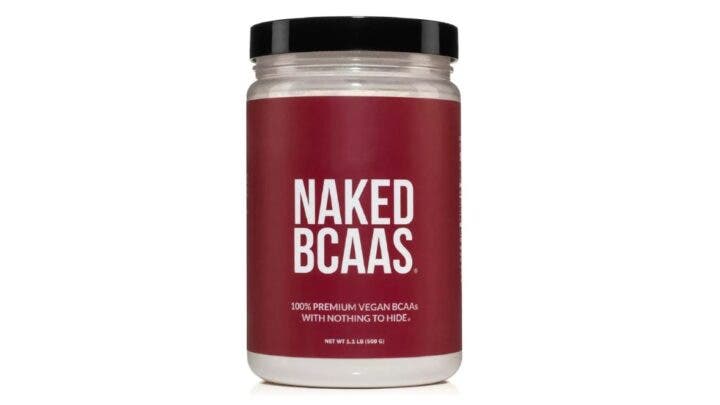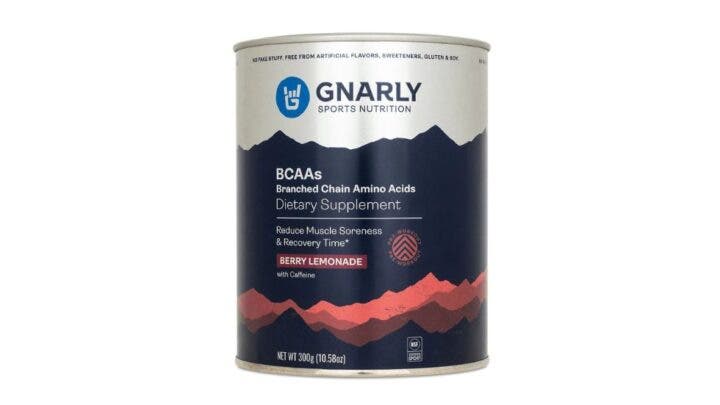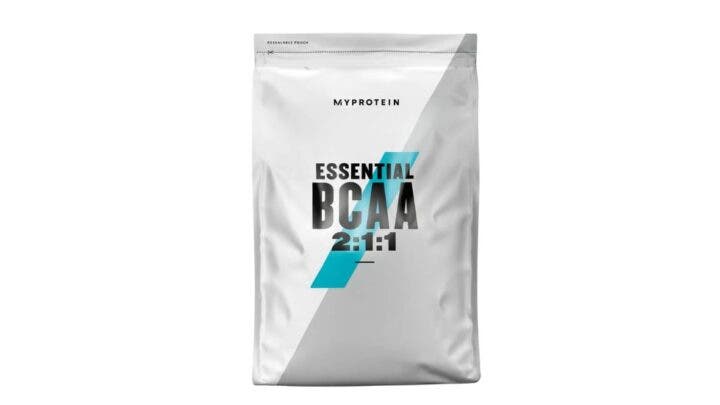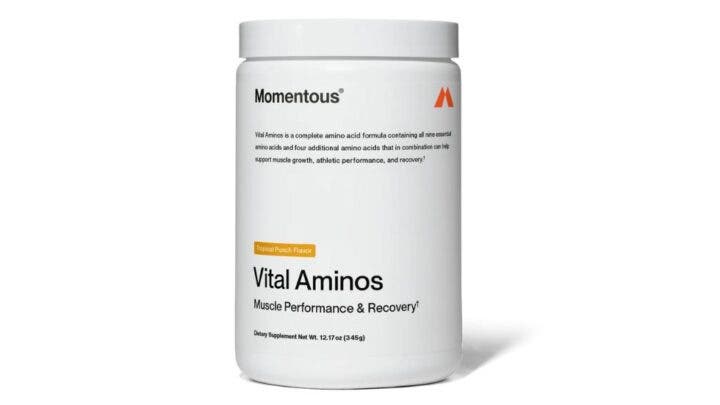If you buy through our links, we may earn an affiliate commission. This supports our mission to get more people active and outside.Learn about Outside Online's affiliate link policy
BCAAs for Triathletes: What You Need to Know

After a triathlon workout, an athlete mixes branched-chain amino acids for muscle repair. (Photo: Triathlete)
Branched-chain amino acids (BCAAs) for triathletes explained
As more athletes incorporate supplements into their diets, a specific group of amino acids has gained attention: branched-chain amino acids (BCAAs). These amino acids are popular among various athletes, from bodybuilders to triathletes, because of their potential benefits for muscle growth, exercise performance, and recovery.
For athletes seeking to enhance their muscle performance and recover more quickly after intense workouts, BCAAs seem like a sensible supplement choice. Must be a no-brainer supplement for hard-charging athletes, right?
Here’s more information on BCAAs, including what they are and how they may (or may not) support your training.
What are BCAAs?
There are three BCAAs: valine, leucine, and isoleucine. These three amino acids are considered “essential” because the body cannot make them on its own, so you must get them from foods or supplements. As a reminder, amino acids like BCAAs are the building blocks of protein, which help your body build muscle, repair muscle damage, make hormones, regulate immune function, and much more.
The “branched” part describes the chemical shape of the amino acid, which impacts how they are digested, absorbed, and used in the body.
How do BCAAs work in an athlete’s body?
Branched-chain amino acids boast the unique ability to promote muscle repair and growth to a greater degree than other amino acids, which is why some athletes include higher amounts of them in their nutrition regimen. Improving muscular repair allows athletes to recover faster from tough workouts and increasing muscular growth is a means to making us stronger, faster, more resilient athletes.
The amino acid leucine, in particular, has been shown to activate a key protein synthesis pathway called the mammalian target of rapamycin (mTOR). This activation promotes muscle protein synthesis and helps to halt muscle breakdown. Though it appears leucine needs the help of its BCAA brethren to reach full potential.
BCAAs can also make you feel less beaten up after you have gone through a supercharged workout. Several research papers (including this one, this one, and this one) have found supplementation of BCAAs leads to a certain degree of reduced post-workout muscle soreness, particularly when the exercise involves a significant amount of muscle damage such as weight training or what would occur with downhill running.
This 2024 study in the journal Nutrients found that when male runners consumed a BCAA-containing sports drink at various points during a 21K run they experienced less muscle breakdown and less muscle soreness 24 hours post run. Although, exercise performance, determined by run time during the final 5K, was no difference between the BCAA drink and the sports drink that did not contain these amino acids.
Branched-chain amino acids appear to lessen exercise-induced muscle soreness by lowering indirect markers of muscle damage (creatine kinase, lactate dehydrogenase, and myoglobin). BCAAs can also lower cortisol, a stress hormone that can increase muscle breakdown, and potentially another way these amino acids can lessen post-training soreness. Interestingly, one study discovered that carbs can be just as effective at ameliorating muscle damage and soreness during a period of hard training as BCAA supplementation.
Another superpower of BCAAs that can directly benefit endurance athletes is their ability to be burned for fuel when working up a sweat. BCAAs can be oxidized in the muscles for energy production, especially during prolonged activities, since they are delivered to working muscles more efficiently than other amino acids because they are not first dealt with in the liver. That means when your carbohydrate (glycogen) stores are running low during a workout, your body can turn to BCAAs for fuel to help delay the onset of fatigue.
The burning of BCAAs may also help spare glycogen stores so you have more of this important energy source to tap into later on during a race. This is especially helpful for endurance athletes including triathletes who tend to use a small amount of protein for fuel during long-duration workouts.
There is also an opportunity for BCAAs to impact the perception of fatigue when pushing the pace. That is because they can compete with other amino acids for transport to the brain, including tryptophan. Tryptophan is an amino acid that gets converted to the hormone serotonin. Serotonin is linked with feelings of calmness and relaxation – not exactly what you want when trying to hit your stride.
This means that consuming BCAAs right before or during exercise, in theory, may lead to reduced fatigue since it limits how much tryptophan makes it to your brain and gets converted to serotonin. But this mechanism needs significantly more research before we can definitively say it’s a way BCAAs can make you feel less lethargic during workouts.

Do BCAAs make you a better endurance athlete?
The research on supplementing with BCAAs for performance gains is hardly a slam dunk.
Despite all the potential for BCAAs to help turn us into hero athletes via their impact on muscle functioning and exercise fatigue, research has largely failed to show supplementation has a noticeable impact on muscle performance and athletic success.
This research review in the journal Nutrients determined that although BCAAs tend to activate anabolic (muscle-making) signals in the body, the benefits on performance and body composition have yet to be shown to be impressive. The authors of the papers highlight the need to better control overall protein intake to better assess any possible impact BCAA supplementation has on athletes. A separate research review in the Journal of the American Nutrition Association also found little evidence that increased intakes of BCAAs through supplementation can improve muscular performance despite proven reductions in levels of post-exercise muscle damage and muscle pain. A scientific review published in the Journal of the International Society of Sports Nutrition suggests the degree that consuming BCAAs on their own can stimulate muscle protein synthesis has been over-estimated in past studies.
As for giving you extra energy to push harder to the finish line, there is a dearth of research to demonstrate that supplementing with BCAAs can provide working muscles with enough added fuel to help endurance athletes go harder for longer. This is especially true if an athlete is starting a workout with adequate glycogen and also consuming enough carbs during the exercise to the point where the usefulness of BCAAs as an important fuel source is moot. This ergogenic effect of BCAAs has been poorly studied.
There are a few reasons why taking BCAAs may not have significant performance benefits for you.
Why you might not need BCAA supplementation
You’re already getting enough
You can source BCAAs from a wide range of foods – both animal and plant-based. So if you are eating enough protein (triathletes can benefit from eating at least 1.2 grams of protein for each kilo of body weight) then getting any extra BCAAs from supplements may have little (if any) additional impact. More is not always better.
Also, if you are using a protein powder you are already obtaining an extra dose of BCAAs. For instance, whey protein has a high amount of leucine and other BCAAs. So taking both a protein powder and BCAAs might be overkill and not necessary for performance gains.
You’re not fulfilling a protein matrix
Taking amino acids in isolation may not be the best method of attack. That’s because the body may respond better to a protein matrix – consuming all of the amino acids. Therefore, while BCAAs can increase muscle protein synthesis, they can’t do so maximally without enough of the other essential amino acids, such as those found in foods and protein powders.
You are too well-trained
There is a real possibility that lesser-trained individuals can benefit more from supplementing with BCAAs because their bodies are less resilient to the rigors of training. A workout in novice athletes may result in a greater amount of muscle breakdown which makes the lesser trained muscles more sensitive to BCAAs. Highly trained individuals just may not be able to reap the rewards of BCAAs because their bodies are less impacted by exercise.
You aren’t lifting enough
To date, most BCAA benefits have been associated with resistance training as this can result in the greatest amount of muscle stress. So if you are mostly in the endurance camp, BCAAs might be less impactful. Again, less helpful if you are already consuming enough total protein, which should give you plenty of BCAAs.
BCAA supplement dose and timing
Common doses are 5-10 grams per day. At this level there is little risk of side-effects. You can take your BCAAs before or after workouts as it’s yet to be determined which protocol is superior. Studies have used many variations in terms of supplement timing and dosage. Ideally, you want a product that supplies a 2:1:1 leucine to isoleucine to valine ratio. Most people mix the powder into a liquid or blend into post-training smoothies.
The bottom line on BCAAs for endurance athletes
Branched-chain amino acids (BCAAs) are oxidized in the muscle and result in stimulating anabolic signals within muscle tissue – which in return may optimize endurance, body composition, and recovery. While that sounds great, we still don’t have much in the way of scientific data to back any performance benefits. Yes, BCAAs can be good for your muscles but so can a chicken breast. So count this as a supplement that you can take if you want to see if it will help with your fitness pursuits, but not one that is a must to branch out into.
The best BCAAs for triathletes
If you decide to try supplementing with BCAAs to see if they can give you an edge and perhaps make you a little more beefy, you can’t go wrong with these brands.
Naked Nutrition Naked BCAAs

This brand has built a reputation around the idea that less is more. This BCAA powder that contains no added sweeteners or flavorings is no exception. Plus, the amino acids are not animal-sourced, so it’s a good option for plant-based athletes.
Gnarly BCAAs – Berry Lemonade

This powder is NSF Certified for Sport so only contains what the label says it does – 5 grams of BCAA in a 2:1:1 ratio per serving – and nothing that could land you in hot water if you are a tested athlete. And it has a fresh flavor that goes down easy.
Myprotein Essential BCAA

You can grab a 1.1-pound bag of the aminos in fun flavors ranging from rainbow sherbet to snow cone. That amount of BCAAs will last you a long, long time. The product supplies the ideal 2:1:1 ratio of leucine to isoleucine to valine.
Momentous Vital Aminos

Momentous ups the ante with a product that not only includes the trio of BCAAs but also all of the other essential amino acids and four additional ones. With this, you get a more expansive amino acid matrix that may do a better job at serving the needs of athletes. And the brand is third-party certified so you know what you are paying for.